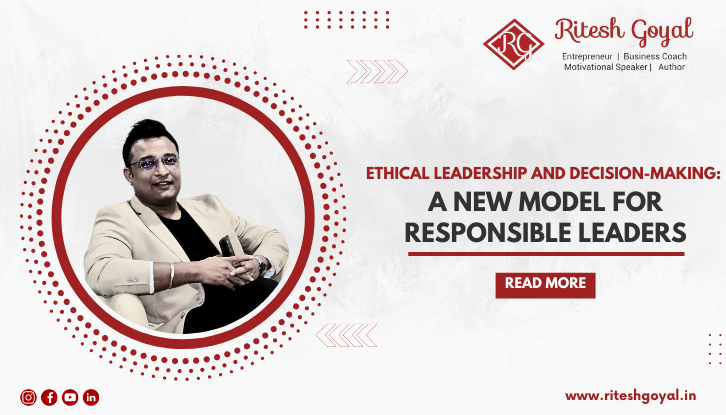
Ethical Leadership and Decision-Making: A New Model for Responsible Leaders
In today’s competitive and ever-changing world, ethical leadership and decision-making play a vital role in shaping organizations and driving societal progress. As a leader, it is essential to navigate ethical challenges and make decisions that align with moral principles while considering the broader implications for society. In this article, I being the educationist, motivational speaker, and business coach, will explore a new model for ethical leadership, focusing on the importance of rational decision-making, ethical consistency, and responsible behavior.
Introduction: The Significance of Ethical Leadership
Ethical leadership is not just about complying with legal and regulatory frameworks; it goes beyond that. It involves setting a moral compass for the organization, fostering a culture of integrity, and making decisions considering the well-being of stakeholders and society. Ethical leaders inspire trust, promote transparency, and lead by example, creating an environment where ethical behavior flourishes.
Understanding Ethical Decision-Making
Ethical decision-making is a process that involves evaluating various options and choosing the one that aligns with ethical principles. It requires leaders to engage their deliberative system, analyze the consequences of their choices, and consider the trade-offs involved. Leaders should strive to maximize well-being while avoiding self-interest and minimizing tribal behavior.
The Cognitive Barriers to Ethical Decision-Making
Our cognitive biases and limitations can hinder ethical decision-making. These biases include confirmation bias, where we seek information that supports our preconceived notions, and availability bias, where we rely on readily available information rather than considering the complete picture. To overcome these barriers, leaders need to adopt a rational decision-making approach and actively adjust their personal goals.
Enhancing Ethical Decision-Making
To enhance ethical decision-making, leaders should allocate their time wisely, comparing options and considering the long-term implications of their choices. They should also engage in ethical negotiation, aiming to create value while managing risks and ensuring fairness. Allocating tasks based on comparative advantage optimizes resource allocation and contributes to ethical outcomes.
The Role of Leaders in Creating Value for Society
Ethical leadership involves considering the broader implications of decisions and striving to create value for society. Leaders should go beyond maximizing individual or organizational interests and apply utilitarian principles that focus on the overall well-being of stakeholders. By taking into account the societal impact of their choices, leaders can contribute to a more sustainable and equitable future.
Overcoming Self-Interest and Tribal Behavior
Ethical leadership requires leaders to rise above their self-interest and minimize tribal behavior. Leaders should be guided by moral principles and avoid favoritism or bias. By treating all stakeholders fairly and impartially, leaders can foster an inclusive and harmonious work environment that promotes ethical behavior.
Trade-offs and Ethical Negotiation
In ethical decision-making, trade-offs are inevitable. Leaders should carefully consider the trade-offs involved and make decisions that optimize overall well-being. Ethical negotiation plays a crucial role in finding win-win solutions, where value is created while managing risks and ensuring fairness.
Optimizing Resource Allocation
Leaders should optimize resource allocation by assigning tasks based on comparative advantage. This approach ensures that resources are used efficiently and ethically, maximizing the value created for stakeholders. By aligning skills and expertise with tasks, leaders can drive innovation and productivity while maintaining ethical standards.
Ethical Consistency and Influencing Colleagues
As a educationist I would say that leaders should strive for ethical consistency in their actions and decisions. Consistency builds trust and credibility among colleagues and stakeholders. Additionally, leaders have the responsibility to influence their colleagues positively. By setting an example and communicating the importance of ethics, leaders can create a culture that values and prioritizes ethical behavior.
Setting Ethical Norms
Ethical leadership involves setting ethical norms and standards within the organization. By establishing clear guidelines and expectations, leaders provide a framework for ethical decision-making. These norms help employees navigate complex situations and make choices that align with the organization’s values and principles.
Nudges and Decision-Making Environments
Leaders can shape decision-making environments by implementing nudges. Nudges are subtle changes in the context or presentation of choices that influence decision-making in a positive way. By designing environments that nudge individuals towards ethical behavior, leaders can create an atmosphere where ethical decision-making is more likely to occur.
Addressing New Ethical Challenges
Leaders must be prepared to address new ethical challenges in an evolving world. They should stay informed about emerging ethical issues and adapt their leadership approach accordingly. Responsible leadership involves proactively identifying and addressing ethical challenges, promoting continuous learning, and fostering a culture of ethical awareness and responsibility.
Conclusion
Ethical leadership and decision-making are indispensable in today’s society. By adopting a new model for ethical leadership, which involves rational decision-making, ethical consistency, and responsible behavior, leaders can positively impact their organizations and society at large. As leaders, it is our duty to navigate the complex ethical landscape, make decisions that consider the well-being of all stakeholders, and contribute to a more sustainable and equitable future.
FAQs
Q: What is ethical leadership?
A: Ethical leadership refers to leading by example and making decisions that align with moral principles while considering the well-being of stakeholders and society.
Q: How can leaders enhance ethical decision-making?
A: Leaders can enhance ethical decision-making by engaging in rational decision-making, considering long-term implications, and engaging in ethical negotiation.
Q: Why is ethical consistency important in leadership?
A: Ethical consistency builds trust and credibility among colleagues and stakeholders, creating a culture that values and prioritizes ethical behavior.
Q: What are nudges in decision-making?
A: Nudges are subtle changes in the context or presentation of choices that influence decision-making in a positive way, encouraging ethical behavior.
Q: How can leaders address new ethical challenges?
A: Leaders should stay informed about emerging ethical issues, proactively identify challenges, and foster a culture of ethical awareness and responsibility.
